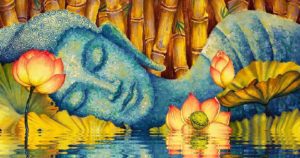 The everyday example of the joke can serve as a helpful model for understanding the structure of “Not only synonymous but also irrevocably opposed” or “Indeed identical only by means of their opposition” in everyday Jokes, with the provisional (conventional) as the setup and the ultimate as the punch line, thus preserving both the contrast between the two and their ultimate identity in sharing the quality of humorousness that belongs to every atom of the joke considered as a whole, once the punch line has been revealed. The setup is serious, while the punch line is funny. The funniness of the punch line depends on the seriousness of the setup, and on the contrast and difference between the two. However, once the punch line has occurred, it is also the case that the setup is, retrospectively, funny; we do not say that the punch line alone is funny, but that the whole joke was funny. This also means that the original contrast between the two is both preserved and annulled: neither funniness nor seriousness means the same thing after the punch line dawns, for their original meanings depended on the mutually exclusive nature of their defining contrast. Each is now a center that subsumes the other; they are intersubsumptive. [By the same token, ultimate truth is identical with conventional truth when by conceptual cognitive process (inference) we understand the reality of phenomena (emptiness).] As a consequence, the pragmatic Buddhist standard of truth is applied more liberally here: all claims, statements, and positions are true in the sense that all can, if properly recontextualized, lead to liberation— which is to say, to their own self-overcoming. Conversely, none will lead to liberation if not properly recontextualized.
The everyday example of the joke can serve as a helpful model for understanding the structure of “Not only synonymous but also irrevocably opposed” or “Indeed identical only by means of their opposition” in everyday Jokes, with the provisional (conventional) as the setup and the ultimate as the punch line, thus preserving both the contrast between the two and their ultimate identity in sharing the quality of humorousness that belongs to every atom of the joke considered as a whole, once the punch line has been revealed. The setup is serious, while the punch line is funny. The funniness of the punch line depends on the seriousness of the setup, and on the contrast and difference between the two. However, once the punch line has occurred, it is also the case that the setup is, retrospectively, funny; we do not say that the punch line alone is funny, but that the whole joke was funny. This also means that the original contrast between the two is both preserved and annulled: neither funniness nor seriousness means the same thing after the punch line dawns, for their original meanings depended on the mutually exclusive nature of their defining contrast. Each is now a center that subsumes the other; they are intersubsumptive. [By the same token, ultimate truth is identical with conventional truth when by conceptual cognitive process (inference) we understand the reality of phenomena (emptiness).] As a consequence, the pragmatic Buddhist standard of truth is applied more liberally here: all claims, statements, and positions are true in the sense that all can, if properly recontextualized, lead to liberation— which is to say, to their own self-overcoming. Conversely, none will lead to liberation if not properly recontextualized.
Source: Ziporyn, Brook, The Deluded Mind as World and Truth Epistemological Implications of Tiantai Doctrine and Praxis in Jingxi Zhanran’s Jingangpi and Zhiguan yili. In William Edelglass & Jay L. Garfield, eds., BUDDHIST PHILOSOPHY, Essential Readings, Oxford University Press, 2009.